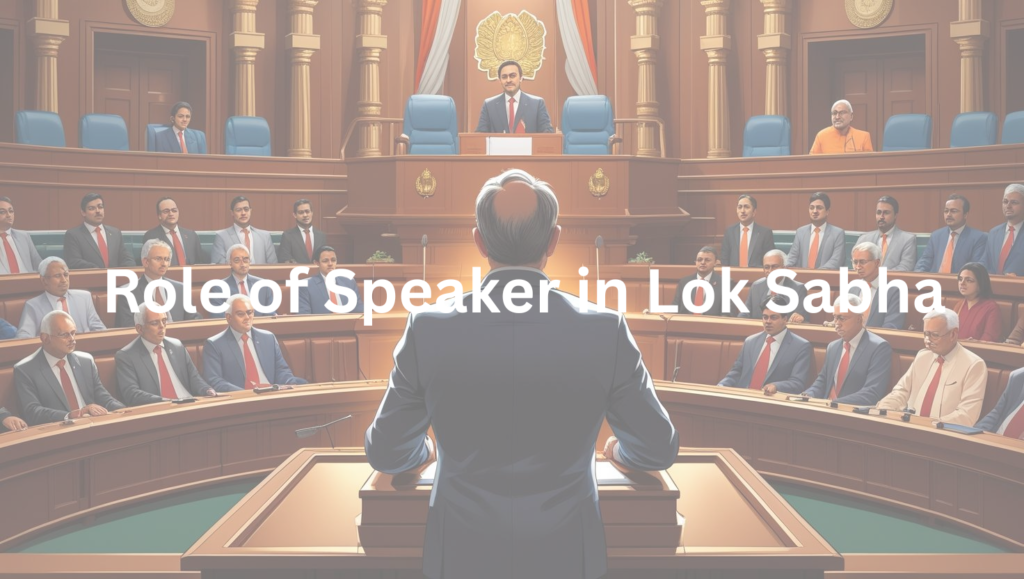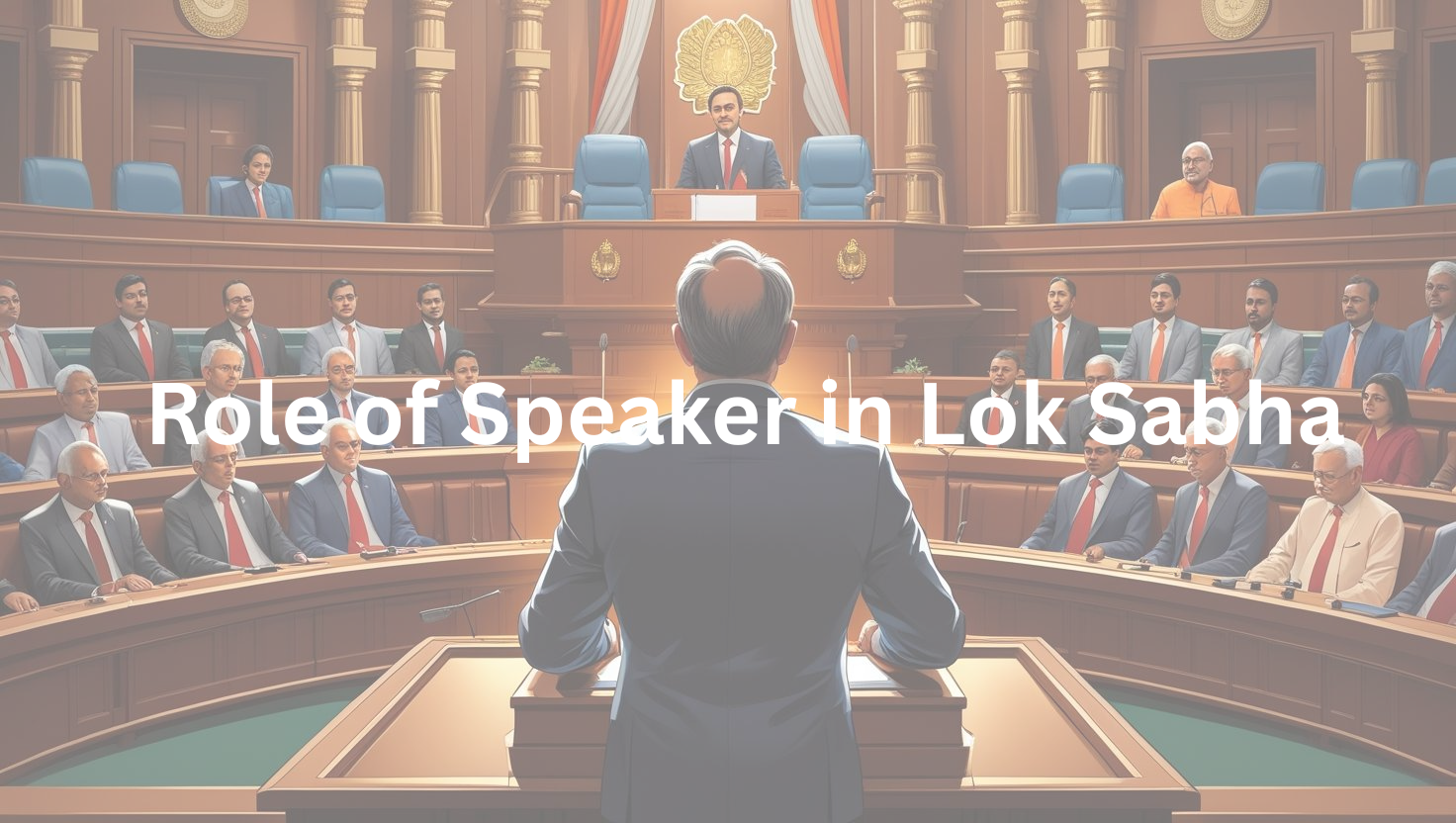Functions and Powers of the Speaker of Lok Sabha: Role, Responsibilities, and Challenges
The Speaker of the Lok Sabha plays a central role in maintaining the structure and sanctity of India’s parliamentary democracy. As the head of the lower house of Parliament, the Speaker acts as the guardian of the rules, upholder of order, and protector of democratic values. Empowered by the Constitution of India, the Speaker’s position is both prestigious and pivotal in ensuring that legislative proceedings are fair, neutral, and productive.

Presiding Over Speaker of Lok Sabha Sessions
The Speaker’s primary responsibility is to preside over the sittings of the Lok Sabha, as provided under Article 95 of the Constitution. This includes:
- Maintaining order and decorum during debates.
- Ensuring discipline among members, especially during heated discussions.
- Deciding who speaks and when, giving every member a fair chance to voice opinions.
- Suspending or expelling members in case of unruly behavior.
The Speaker must remain vigilant and ensure that all debates are conducted in a respectful and structured manner, allowing Parliament to function smoothly.
UPSC CSAT Answer Key 2025 PDF Download – All Sets
Authority to Enforce Rules and Interpret Procedures
The Speaker wields the authority to interpret rules of procedure and make decisions on points of order raised by members. This power is essential in preventing any ambiguity during the proceedings and maintaining the integrity of parliamentary functions.
The Speaker can:
- Clarify procedural doubts.
- Set precedents based on rulings.
- Dismiss motions that don’t comply with the house rules.
Such decisions are final and not subject to debate, showcasing the Speaker’s command over legislative norms.
Certification of Money and Financial Bills
Under Article 97, the Speaker is entrusted with the task of certifying Money Bills and Financial Bills. This power is critical because:
- Only Money Bills can be introduced in the Lok Sabha.
- The Rajya Sabha cannot amend or reject a Money Bill.
- The certification by the Speaker cannot be challenged in court.
Hence, this certification influences fiscal policy and financial governance directly.
Casting Vote in Case of Tie
As per Article 100, the Speaker does not vote in the first instance. However, in case of a tie, the Speaker casts the deciding vote, known as the casting vote. This unique power reinforces the Speaker’s decisive role during legislative deadlocks.
Spokesperson and Representative of the Lok Sabha
The Speaker also functions as the official spokesperson of the Lok Sabha:
- Represents the Lok Sabha during joint sittings.
- Attends international conferences, bilateral visits, and ceremonial events.
- Receives foreign dignitaries and delegations.
The Speaker’s diplomacy and public communication reflect the ethos of the Indian Parliament at both national and international forums.
Ensuring Transparency and Accountability
To maintain public trust, the Speaker of lok sabha is responsible for ensuring that the workings of the Lok Sabha are:
- Transparent and accessible to the public.
- Well-documented through live telecasts, press briefings, and reports.
- Open to media coverage, enhancing parliamentary accountability.
This openness ensures that citizens remain informed about legislative debates and the decisions that affect their lives.
Chairing Parliamentary Committees
The Speaker appoints and refers bills to various Parliamentary Committees, such as:
- Standing Committees
- Select Committees
- Ad-hoc Committees
The Speaker also nominates committee chairpersons, ensuring that legislative scrutiny and evaluation of bills are done thoroughly and impartially.
Disqualification of Members Under Anti-Defection Law
The Speaker has the authority to decide cases under the Tenth Schedule (Anti-Defection Law):
- If a member defects from their party, the Speaker of lok sabha can disqualify the member.
- However, this power must be exercised impartially and judiciously.
In Kihoto Hollohan vs. Zachilhu (1992), the Supreme Court held that the Speaker’s decision is subject to judicial review, underscoring the need for neutrality.
Challenges Facing the Speaker’s Office
Despite its significance, the office of the Speaker has faced multiple challenges:
1. Allegations of Partisanship
- Speakers are often accused of being biased towards their own political parties.
- This can damage the credibility and neutrality of the position.
2. Arbitrary Use of Discretion
- Critics claim that discretionary powers are sometimes used unfairly.
- The lack of transparency in decisions, especially in disqualification matters, has raised concerns.
3. Handling of Disruptions
- With frequent walkouts and shouting matches, maintaining order is tougher than ever.
- The Speaker is often criticized for favoring certain parties or MPs during disciplinary actions.
4. No Mandatory Resignation from Party
- Unlike the UK, India does not mandate the Speaker to resign from their political party upon election.
- This creates a conflict of interest, undermining the Speaker’s claim of impartiality.
5. Media Communication Issues
- The Speaker, being the voice of the House, must engage transparently with the press.
- A lack of open communication leads to media mistrust and misinformation.
How to Strengthen the Speaker’s Office
To ensure that the office remains effective and unbiased, the following reforms can be adopted:
Resignation from Political Party
- Following the United Kingdom model, the Speaker should resign from their party upon election to uphold neutrality.
Empowering Oversight Functions
- The Canadian system allows the Speaker to summon ministers for questioning.
- Granting similar powers in India would enhance executive accountability.
Set Timeline for Disqualification Decisions
- Parliament should enforce a strict timeline for decisions under the Anti-Defection Law to avoid prolonged political manipulation.
Independent Appointment Panel
- Create a non-partisan panel to appoint the Speaker, minimizing political interference.
Stronger Role in Parliamentary Ethics
- The Speaker should take the lead in enforcing a code of conduct for MPs, promoting responsible legislative behavior.
Conclusion: The Pillar of Parliamentary Democracy
The Speaker of Lok Sabha is more than just a moderator. They are the custodian of constitutional values, parliamentary ethics, and democratic integrity. With great power comes great responsibility—and in this case, the Speaker’s role determines the very tone and functionality of our democracy.
Fairness, transparency, and impartiality must always remain at the heart of the office. By adopting global best practices and instituting essential reforms, the Office of the Speaker can rise above controversies and continue to be a beacon of trust and authority in Indian governance.
Speaker of Lok Sabha UPSC PYQs
Q1. Consider the following statements: (UPSC Prelims 2025)
- On the dissolution of the House of the People, the Speaker shall not vacate his/her office until immediately before the first meeting of the House of the People after the dissolution.
- According to the provisions of the Constitution of India, a Member of the House of the People on being elected as Speaker shall resign from his/her political party immediately.
- The Speaker of the House of the People may be removed from his/her office by a resolution of the House of the People passed by a majority of all the then Members of the House, provided that no resolution shall be moved unless at least fourteen days’ notice has been given of the intention to move the resolution.
Which of the statements given above are correct?
a) 1 and 2 only
b) 2 and 3 only
c) 1 and 3 only
d) 1, 2 and 3
Ans: (c)
